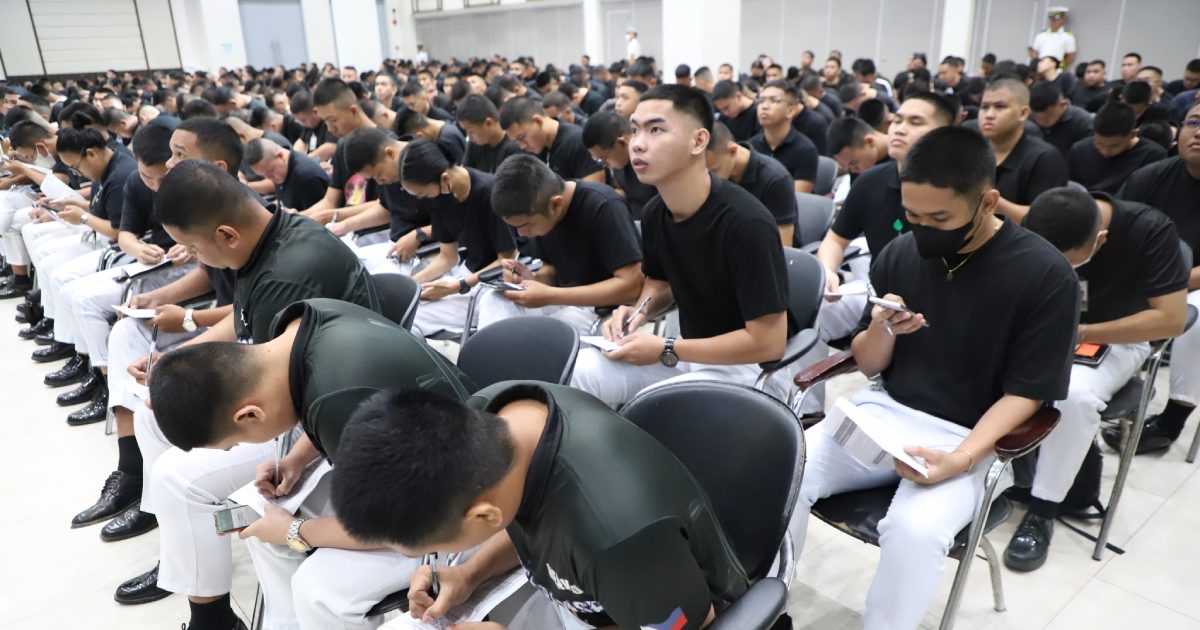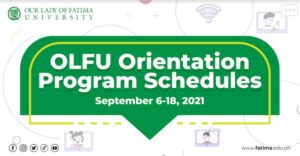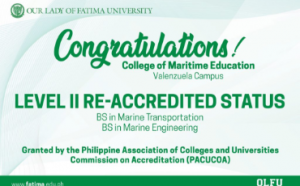In a resounding success, the College of Maritime Education (CME) recently conducted a two-session Onboard Training (OBT) orientation for third-year cadets. The event, held on 25 March 2024, at the Our Lady of Fatima University’s (OLFU) RISE Tower, brought together over 800 Marine Transportation and Marine Engineering students eager to delve into the intricacies of maritime training.
Navigating the Seas of Knowledge
The Assembly Hall was packed with young, aspiring naval experts as they gathered to explore both the fundamental and advanced aspects of onboard training.

Under the leadership of distinguished CME faculty members comprising 2/E Mark Anthony Ramos, OBT Supervisor, and 3/E Reynaldo Osma Jr., OBT Assistant Supervisor, the cadets embarked on a journey that would shape their careers as maritime professionals.
Insights from The Helm
College Dean Francis Jay Dela Cruz, a seasoned mariner and maritime academic leader, delivered a comprehensive opening address. His insightful narratives, drawn from personal experiences and administrative perspectives, resonated with the aspiring cadets.

“Your goal should not lead your brain. Nandyan lang dapat ‘yan. Ang goal mo ay maging opisyal ka. Makapag-barko ka at magtuloy-tuloy maging officer [Your goal should not lead your brain. Let it motivate you instead. The goal is for you to board the ship and eventually become an officer],” said the dean, who bared the challenges of pursuing a maritime career.
Dean Dela Cruz also emphasized the importance of resilience, adaptability, and ethical conduct as they navigate the dynamic waters of the competitive industry.
Charting the Course: Orientation Highlights
The stage was set as 2/E Ramos took the podium. With precision and clarity, he guided the cadets through a multifaceted agenda.

Cadets gained a holistic understanding of onboard training, its significance, and its role in shaping competent seafarers during the overview section of the OBT.
This was followed by the intricate details of the 12-month/36-month seagoing service as demystified by the supervisor, ensuring cadets were well-prepared for their future roles.
Ramos also covered pertinent enrollment processes, from paperwork to deadlines. Cadets learned the ropes of enrolling in OBT. For the most part, the documentary requirements were also the highlight of the session.
To ensure safety during training, the cadets were also briefed on the mandatory training modules, including onboard protocols and emergency procedures.
As emphasized by Ramos, proper college endorsement of cadets by designated shipping companies is paramount, as it will simplify and verify the OBT enrollment process, securing pre-embarkation requirements smoothly. The same CME faculty schooled the cadets to meticulously analyze their OBT contract and agreement.
Finally, the supervisor also covered the significance of an accurate Training Record book (TRB) and underscored the art of documenting their Daily Journal of Bridge Watchkeeping Duties (DJWD).
Hands-On Workshop: Crafting Competence
The workshop segment, led by 3/E Osma Jr., put theory into practice. Cadets honed their skills in preparing the TRB, DJWD, and Onboard Training Guidance (OTG).

The interactive session allowed them to grapple with real-world scenarios and fine-tune their documentation prowess. During the dedicated open forum, students also explored more questions and processes regarding OBT.
Succinctly put, the OLFU CME’s commitment to excellence shone through during the transformative orientation.
As the cadets prepare to embark on their seafaring journeys, they carry with them the knowledge, skills, and determination to conquer the high seas.M
Drawing the orientation to a close, the bridge between academia and industry was forged as cadets discovered how they would transition from the classroom to real-world vessels. – Raymond Lumagsao



